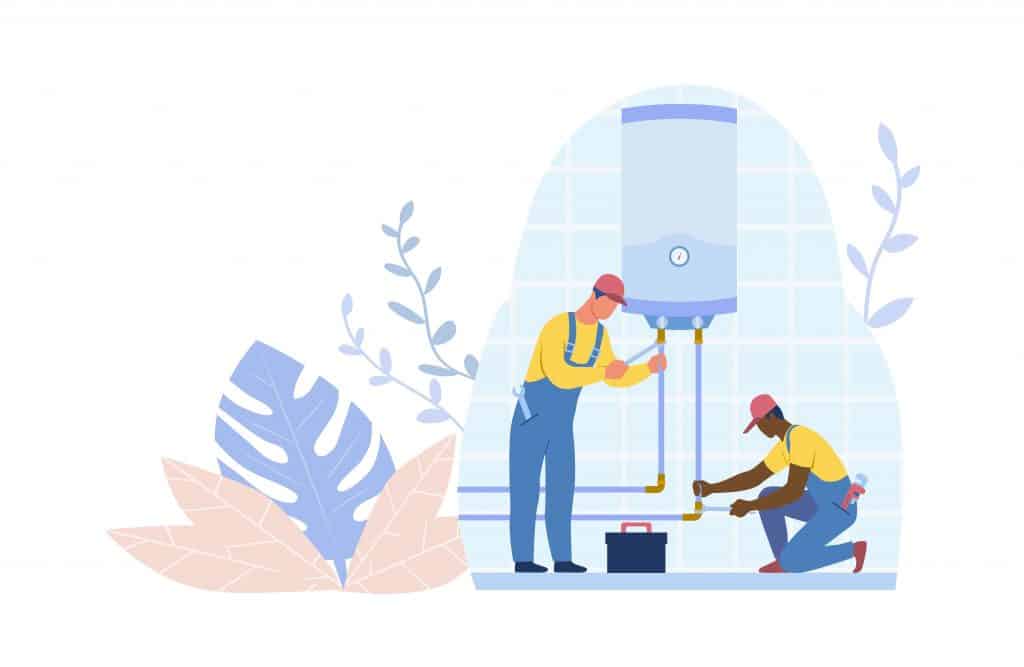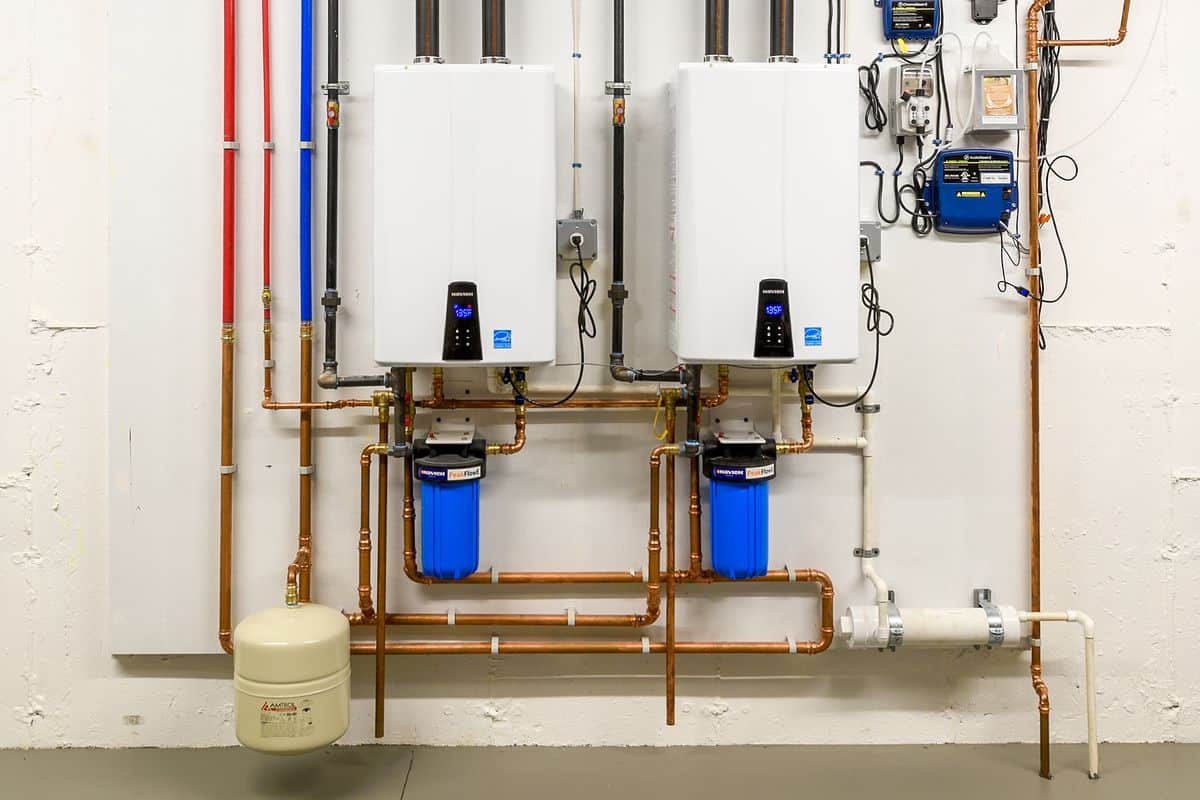
Depending on the quality of the model you select, a tankless water heater, whether it be an electric water heater or a gas water unit on average can last between 15 and 20 years with proper care and use.
A tank unit, on the other hand, typically has a lifespan of 10 years or less. Tankless water heaters provide a supply of hot running water on demand to showers, baths, and faucets for example using cutting-edge technology.
Compared to tanked hot water, these heaters do not conserve water. Regarding the lifespan of tankless water heaters, the answer is that they outlast other hot water systems in most cases.
A tankless system’s life will be significantly lengthened if they are flushed regularly. Regular maintenance on your tankless water heater will prolong the life of your tankless water system. If you want to increase the lifespan of your tankless water heater, call for a professional tankless water heater repair.
Tankless water heaters function by using an electric element or a gas burner to heat the water as it enters the unit through a pipe.
With instant comfort and convenience, this gives endless hot water.
In contrast to conventional water storage tank heaters, the hot water supply is not retained in the tank.

Compared to conventional water heaters, which are constantly exposed to moisture, tankless water heaters are less susceptible to corrosion caused by water. A tankless water heater has an average lifespan of 20 years compared to a typical water heater’s 12 years.
Compared to tank water heaters, tankless water heaters are far more efficient and less corrosive. They have a longer life expectancy and as a result, are less expensive to operate in the long term. Compared to conventional tanked water heaters, tankless water heaters are less exposed to water, which makes them less vulnerable to corrosion and scale from hard water.
The lifespan of a tankless water system is longer than the tanked water heater since it collects fewer corrosive sediments such as calcium, silt, and other minerals from the incoming flow of hard water.
Deposits of calcium, silt, and other minerals can reduce the efficiency of your tankless heater. Therefore, it is important to regularly clean your tankless hot water system. Calcium and silt building function as an insulator, using more energy than necessary and preventing the components from adequately heating the water.
Your tankless water heater’s flow rate may also be decreased by clogged pipes due to the accumulation of minerals and sediment. Sediment may build up to the point where it obstructs pipes, causing clogs, leaks, and possibly even harm to the water heater.
A well-built and maintained on-demand tankless system can last up to 25 years, however low-quality incoming water will limit the life of your tankless heater! One of the simplest methods to protect your tankless water heater is to make sure the water entering it is clean and clear of debris and minerals. Water softeners, sediment filters, and frequent flushing all help to give your tankless water heater a longer life.
Some of the issues include insufficient hot water, variable water temperature, and increased energy expenses.
Why is the lifespan of a tankless water heater twice that of a tanked heater? This is due to the minerals found in hard water. A typical steel tank will corrode from the inside out and finally leak.
Tankless water heaters are popular. They consume less energy than storage water heaters because they heat water only when it is needed rather than storing hot water. Because they do not hold hot water, leaks are far less likely.
However, after a few years of use, the piping and joints may leak. A leak is unlikely, but if ignored, it can be disastrous, resulting in high water damage restoration costs.
Of course, such problems can be avoided, you can prevent a burst, leak, or flood from a water heater by taking the procedures of regular maintenance tasks listed below.
Whether you do it yourself or call a plumber, the tank should be drained and flushed, the anode rod examined, the T&P valve tested, the temperature set correctly, the flooring covered, and the anode rod tested.
If not properly maintained, the leakage could destroy your property, develop mold, or even cause bodily harm.
If you want to avoid leaks, you can choose the most durable tankless systems, or you can install a leakage sensor that will notify you if a leak happens.
Replace every 10–12 years and do annual inspections.
With the tankless water system, there is no threat of an explosion in the water tank. Not to say that it is common for tanked water systems to explode, but it can happen.
The metal tanks are designed to withstand incredibly high temperatures and pressures. Most tank water heaters have a pressure release valve and when it works well it eliminates the possibility of the tank exploding.
Sediments, on the other hand, tend to accumulate over time. This sediment might jam the valve and prevent it from releasing the pressure created by the hot water.
Tankless water heaters have safety valves that, if the pressure gets too high, let the water out, eliminating the possibility of tank explosions. You can therefore be sure that your tankless water heater is secure.

Turn off the electricity to any electric heaters you may have by going to your circuit panel.
Even though it’s not necessary, you can also turn off the heater’s power as an extra precaution.
If your heater runs on gas, you can turn the valves counterclockwise to turn off the gas supply.
Turn off the input and output water supply valves, which are usually located beneath the water heater.
If your heater has a drain valve, open it to drain any water that is currently inside the device.
Connect the input valve with one end of a hose. Connect the pump’s opposite end. The second hose should be connected to the output valve. Insert the hose’s opposite end into the bucket.
Fill the bucket with the vinegar to descale. Insert the pump into the bucket.
Turn on your heater’s hot water valves. After that, turn on the pump. There’s a risk your pump won’t have an on/off switch and will instead turn on when you plug it in.
Therefore, you should immerse the pump in the solution before beginning.
Allow the pump to run for 45 minutes after turning it on. When that time is up, switch off the pump.
Before proceeding, allow any remaining vinegar to drip from the heater and into the bucket.
At least once a year
Tankless water heaters, as previously indicated in this article, have a far longer lifespan than storage tank heaters. If properly maintained, a tankless unit will heat your water for 20-30 years. This is far superior to the normal storage-tank water heater lifespan of 10-15 years.
Mike Joshua, a 33-year-old plumber based in California. With a passion for solving complex problems and a commitment to his trade, Mike has dedicated the past 8 years of his life to honing his skills as a professional plumber. After completing technical college Mike quickly secured a job in a plumbing company and has been working steadily ever since. Mike's experience includes not only households but industrial gas and plumbing systems and installation, repair the equipment for different types of business He is known for his attention to detail, strong work ethic, and ability to complete projects on time and within budget. He is always striving to improve his skills and stay up-to-date with the latest industry developments and advancements. In conclusion, Mike enjoys outdoor activities such as hiking and camping. He also has a passion for DIY projects around the home and is always looking for new challenges to tackle.

